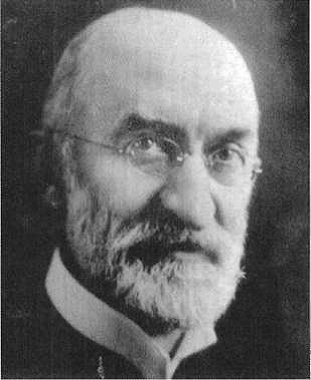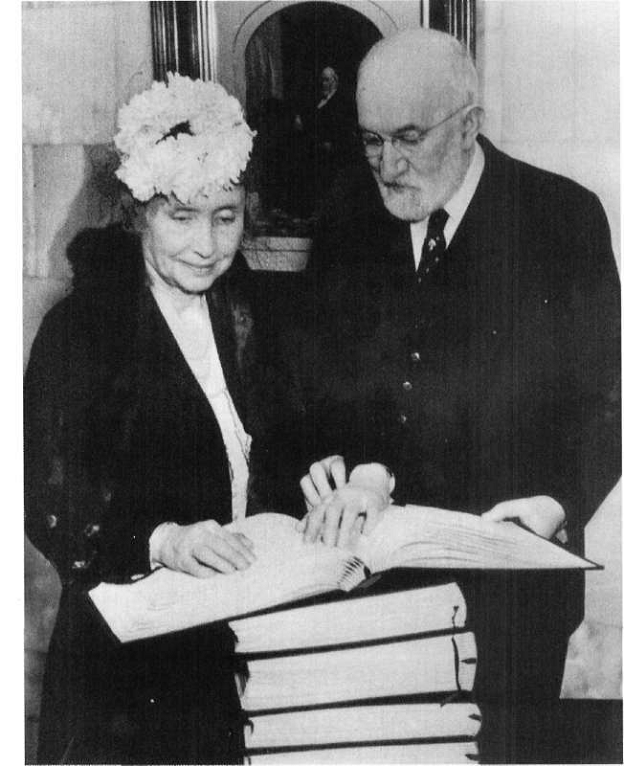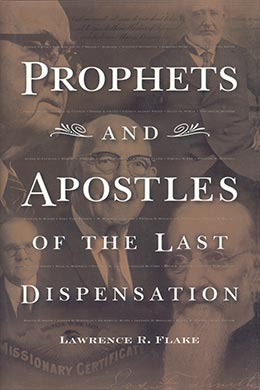Heber Jeddy Grant
Lawrence R. Flake, Prophets and Apostles of the Last Dispensation (Provo, UT: Religious Studies Center, Brigham Young University, 2001), 67–73.

Born: 22 November 1856, Salt Lake City, Utah
Quorum of the Twelve Apostles: 16 October 1882 (age 25)
President of the Quorum of the Twelve: 23 November 1916
President of the Church: 23 November 1918 (age 62)
Died: 14 May 1945 (age 88), Salt Lake City, Utah
Heber Jeddy Grant, a child of promise, was the only son of Jedediah M. Grant, apostle and member of the First Presidency, and Rachel Ivins Grant, who was left a widow when little Heber was only nine days old. His mother told him repeatedly that if he would but “behave himself” he would someday be an apostle. Her confidence was founded in two prophecies concerning her son’s future. The first one was uttered at a Relief Society meeting where Eliza R. Snow spoke in tongues concerning the future of little Heber, who was playing on the floor with the other children. The other prophecy was made by President Heber C. Kimball, who picked up the boy before a large crowd at a banquet and spoke concerning him. Sister Grant later told her son, “He prophesied in the name of the Lord Jesus Christ that you would become an Apostle of the Lord Jesus Christ and become a greater man in the Church than your own father.” [1]
As a boy Heber J. Grant exemplified the principle of persistence. He spent countless hours throwing a baseball against a barn until he perfected his pitching skill. With the same determination he became an excellent penman. Though nearly tone-deaf, he doggedly learned to sing a number of hymns on key.
He had an outstanding aptitude for a career in business. In his youth he already seemed to possess an uncanny ability to make money, whether it was shining shoes, working for Wells Fargo as a clerk, or writing “Happy New Year” with his beautiful penmanship on ninety dozen greeting cards.
On many occasions his life demonstrated the Lord’s willingness to help His children in their temporal affairs. He once donated fifty dollars he had earned to a building project. The bishop, seeing the money, promptly returned forty-five dollars’ change, saying that five dollars was his full share. Young Heber gave him the money again, stating that his widowed mother needed two hundred dollars and he knew of no way to get it except by putting the Lord in his debt. Within the next few days Heber received an inspiration to write a certain man in the Wells Fargo Company, asking him if he would like to purchase some bonds. The man did so and Heber’s profit on the transaction was $218.50, the amount his mother needed and almost enough to pay tithing on the sum. Sometimes his financial successes dealt with sums a great deal larger than that. Following a blessing given to him by President Wilford Woodruff in which he was promised success in his financial venture, he managed to raise $88,000 at only 6 percent per annum when money was lending at a much higher rate. When he opened the State Bank of Utah, he raised $500,000, and another time he raised $100,000 for the Utah and Idaho Sugar Company.
Perhaps the Lord’s willingness to bless Brother Grant financially stemmed from the way Brother Grant used his worldly acquisitions. He was known for his great generosity, and on every hand he donated to the widow and the unfortunate. Numerous times he bought houses or land for people in need, supported missionaries in the field, and bought books by the hundreds to give as gifts to those whose lives he felt could be uplifted by them. An editorial in the Utah Farmer magazine stated: “I am well within the truth when I say that no other man of his means was more generous to the widow and the orphan, to those overtaken with misfortune or sorrow, than he was.” [2]
In all of his mammoth financial undertakings, Heber J. Grant never slighted his Church work. At the age of twenty-four he was ordained a high priest and called to move to Tooele and preside over the stake there. A man whose ambition lay chiefly in the direction of his business career, he had set rigid goals to meet in his life by the time he was thirty-five. But these he relinquished readily when the call came to leave Salt Lake and take up residence in the small Utah town. In this important calling he learned the lesson of humility. He described one of his first speeches as a stake president as a complete “fizzle” because he had not relied on the Spirit. Going to the Lord on his knees in a hayfield afterward, he poured out tears of humility, begging forgiveness and promising to repent: “I told Him there, as a boy, that if He would forgive me for my egotism, if He would forgive me for imagining that without His Spirit any man can proclaim the truth and find willing hearts to receive it, to the day of my death I would endeavor to remember from whence the inspiration comes, when we are proclaiming the Gospel of the Lord Jesus Christ.” [3] From that day on he never spoke without a total dependency upon the Lord and was never again at a loss for words.
One month before his twenty-sixth birthday, Brother Grant was called to the Quorum of the Twelve in a written revelation received by President John Taylor. Even following such a divine manifestation, the young man doubted his worthiness and questioned the Lord concerning his call. One day, while riding alone on the cold Navajo desert, in answer to his prayers, he had a most marvelous vision in which it was manifest to him that his call had indeed originated in heaven, that his deceased father and the Prophet Joseph Smith had desired his appointment, and that because he had led a clean life, he was allowed to have the blessing. It would be left up to him to make a success or a failure of that calling. [4]
Numerous other highly spiritual manifestations occurred in answer to this great man’s prayers. His first wife, Lucy Stringham, was on her deathbed about fifteen years after their marriage. He tried to explain to his five little daughters and son that their mother would not recover this time. The oldest girl did not see why her father would not simply administer to her mother as he had done before and heal her. Brother Grant prayed in earnest that the Lord’s will would be done but that in any event the little girl would not lose her simple faith in the power of the priesthood. Sister Grant died, and not one hour later the oldest daughter was comforting her little brother with these words of faith: “Do not weep, do not cry, Heber; since we went out of this room the voice of the Lord from heaven has said to me, ‘In the death of your Mamma the will of the Lord shall be done.’” [5]
Another time while boarding with a lady and her husband in Washington, D.C., two of Brother Grant’s daughters became ill. The youngest girl was at the point of death but received a powerful blessing from Elder George Q. Cannon, who said, “The adversary, the destroyer, has decreed your death and made public announcement of his decree, but by the authority of the Priesthood of God which we hold as his servants, and in the name of Jesus Christ, our Redeemer, we rebuke the decree.” [6] The little girl did not die, and a few days later the husband in the household related that his wife, a spiritualistic medium, had a dream during the child’s illness in which she saw the little girl die and be transported on a long journey to a valley with a cemetery on a hill. She described the cemetery exactly as it was located in the Salt Lake Valley. Brother Grant said, “By the Priesthood of God rebuking the decree of death, she is alive, healthy and strong. She is the mother of seven beautiful children, and, in the providences of God, George Q. Cannon is their great-grandfather.” [7]
 President Heber J. Grant showing braille Book of Mormon to Helen Keller
President Heber J. Grant showing braille Book of Mormon to Helen Keller
The veil between mortality and the spirit world was often thin for Heber J. Grant. His second and only living son was about to die, as had his firstborn son. Brother Grant saw in a dream the boy’s deceased mother coming to take her child. He saw himself making a violent struggle to prevent the boy from leaving him. Following this dream, he concluded that he should relinquish his desire to have the boy remain alive. Shortly after reaching that decision, the child’s life began to ebb. Brother Grant hastened to his bedside and, as he sat in the room, he felt the presence of his wife, waiting to take her son. Brother Grant said, “I sat by the deathbed of my little boy and saw him die, without shedding a tear.” [8]
In 1918 Heber J. Grant succeeded Joseph F. Smith as president of the Church and served in that office twenty-six years—longer than any president except Brigham Young. His administration was marked by great growth in the kingdom, the membership advancing almost to the million mark. At this time also came a true easing of persecutions. A new spirit of acceptance and almost admiration for the Church was encountered in the outside world. President Grant’s financial genius was a great boon to the Saints, for he managed to clear the Church of debt and acquired many valuable assets in real estate and created other financial strongholds. It was also during President Grant’s administration that the vast Welfare Program of the Church came into being and removed many Latter-day Saints from “the evils of the dole” by providing them with gainful employment.
Having suffered from the effects of paralysis since 1940, President Grant died on 14 May 1945 at the age of eighty-eight. His counselor J. Reuben Clark Jr. paid tribute to him in these words: “God fashioned him in heart and mind and body, in ability, in experience, and in wisdom, just as he has fashioned every man whom he has ever called to lead his people. . . . His was a simple faith. . . . He so lived his life that it had no dark place across which he must draw a curtain. . . . He had the ‘pure and undefiled religion’ of James; he ‘visited the fatherless and the widows in their affliction and kept himself unspotted from the world.’ He was loyal almost to a fault; he was generous beyond compare. . . . He was one of the great ones of the earth.” [9]
Notes
[1] Bryant S. Hinckley, Heber ]. Grant: Highlights in the Life of a Great Leader (Salt Lake City: Deseret Book, 1951), 27.
[2] Bryant S. Hinckley, “Heber J. Grant is Dead,” Utah Farmer, 25 May 1945, 4.
[3] Preston Nibley, The Presidents of the Church (Salt Lake City: Deseret Book, 1959), 283.
[4] Francis M. Gibbons, Heber ]. Grant: Man of Steel, Prophet of God (Salt Lake City: Deseret Book, 1979), 53–55.
[5] Heber J. Grant, “In the Hour of Parting,” Improvement Era, June 1940,330.
[6] “President Grant Relates Incidents to Promote Faith,” Church News, 21 November 1931, 2.
[7] “President Grant Relates Incidents,” 2.
[8] Grant, “In the Hour of Parting,” 383.
[9] Hinckley, Heber J. Grant, 262–64.
